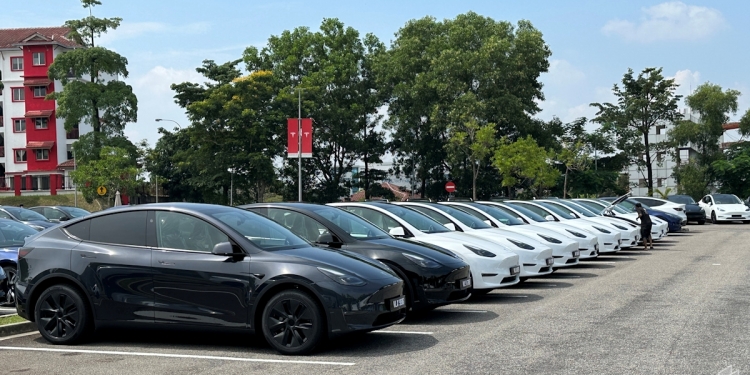It was recently reported that Malaysia’s Electric Vehicle (EV) sales have stagnated as consumers are struggling with the high prices of such vehicles. At the moment, all fully imported (CBU) EVs are exempted from import and excise duties until the end of 2025. However, you won’t find any imported EVs under RM100,000 due to the current policy which is seen as a move to protect the local automotive industry.
So the question is, are fewer people buying EVs in Malaysia? Or is the EV segment actually growing?
Recently, the Malaysian government’s official open data portal (data.gov.my) has updated its vehicle registration database from the Land Transport Department (LTD) and the actual data provides a different picture. We also get a clearer picture of the most registered EV models and the current trend of EV registrations against other vehicle types in Malaysia.
The latest published dataset for vehicle registrations in Malaysia covers the period from 1st January 2020 until 30th April 2024.
Top 15 EV models registered in Malaysia
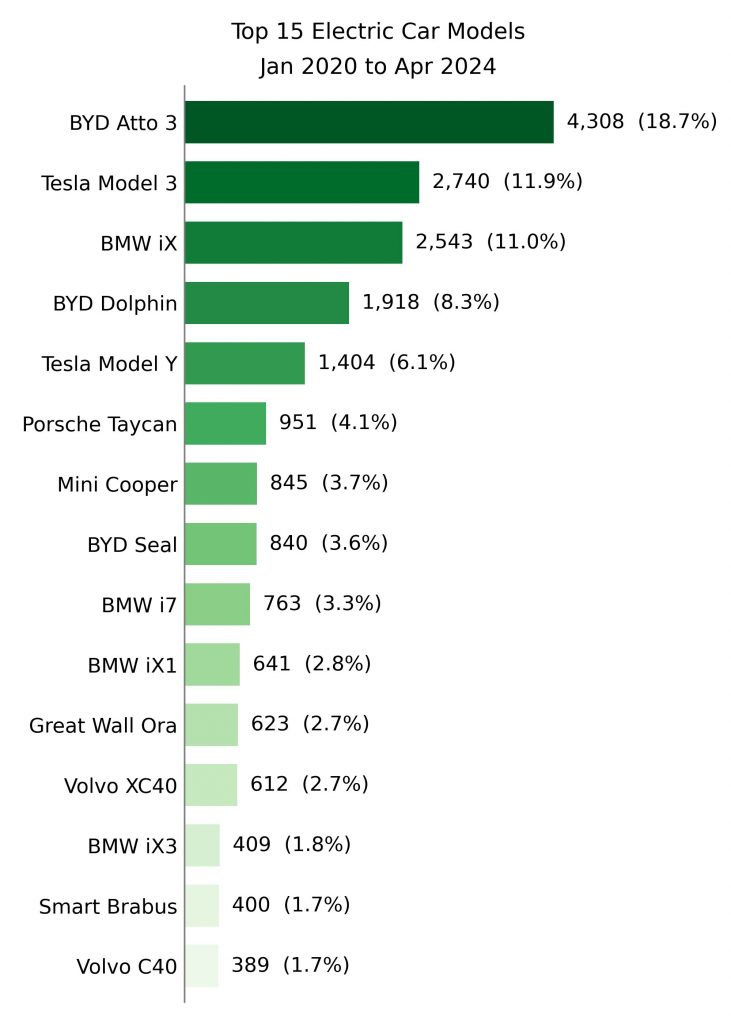
As illustrated by Thevesh with data obtained from the portal, BYD, Tesla and BMW currently dominate the top 3 spots for the most popular electric vehicles registered in Malaysia between January 2020 to April 2024. BYD Atto 3 takes the top spot with 4,308 vehicles registered (18.7%) followed by the Tesla Model 3 with 2,740 units (11.9%) and BMW iX with 2,543 units (11.0%).
Do note that the registration data covers all vehicles registered with JPJ in Malaysia including grey imported EVs.
Malaysia’s most popular EVs registered in the first four months of 2024
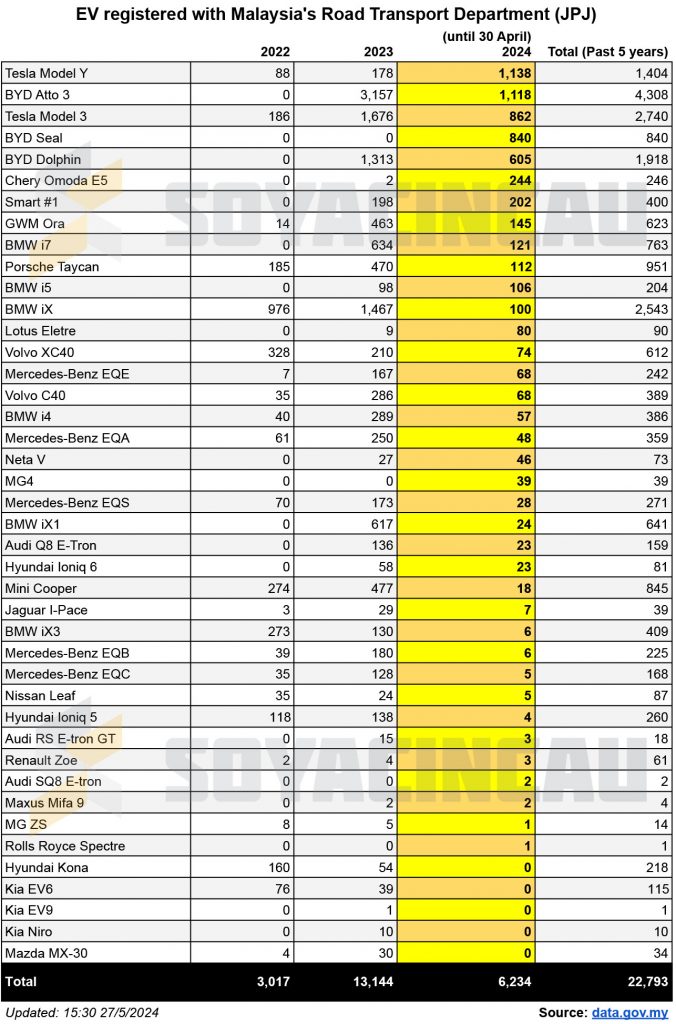
If we look at 2024 alone (1st January until 30th April), the Tesla Model Y is the most popular EV in Malaysia with 1,138 units registered, while BYD Atto 3 takes the #2 spot with 1,118 units. This is followed closely by their sedan models, the Tesla Model 3 at #3 with 862 units and BYD Seal at #4 with 840 units. Taking fifth place is the BYD Dolphin which is currently the best value for money EV priced from just RM100,000.
Based on sheer numbers alone, more BYD EVs were registered – 2,563 units (Seal, Dolphin and Atto 3) which accounts to 40% of total EVs registered in Malaysia within the first four months of the year. Meanwhile, 2,000 Tesla EVs (Model 3 and Model Y) have been registered which is equivalent to 32% of total EVs registered.
Taking the #6 spot is the Chery Omoda E5 with 244 units registered, followed by Smart #1 with 202 units, GWM Ora (presumably Ora Goodcat) with 145 units, BMW i7 with 121 units and the Porsche Taycan with 112 units.
Tesla to overtake BMW in total EV registrations in Malaysia this year?
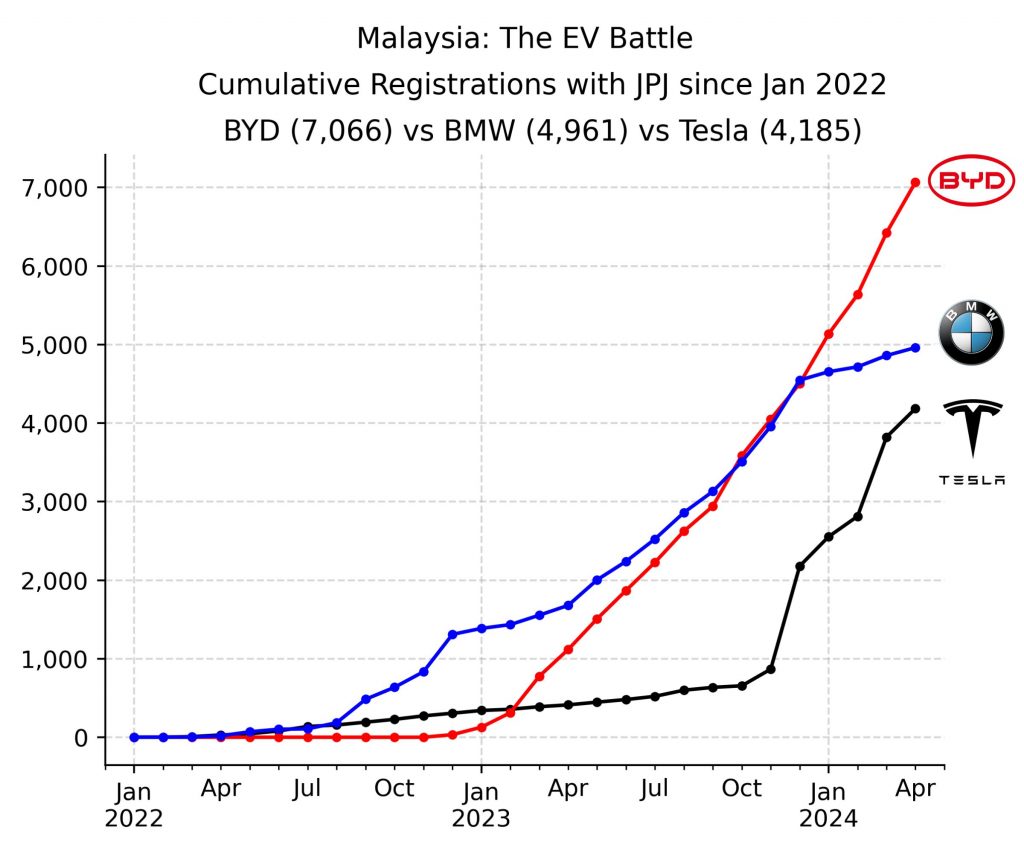
In 2023, BYD was the best-selling EV brand in Malaysia with 4,470 registered, followed closely by BMW with 3,237 units registered. Looking at the trend, it appears that Tesla is growing rapidly in Malaysia with the release of its Model 3 and Model Y that are priced from less than RM200,000.
BMW has started to show slower growth for EV registrations this year. Unlike Tesla and BYD where electric SUV models are doing better, BMW’s electrified sedans such as the BMW i7 and i5 are the more popular choice compared to their SUV models such as the BMW iX, iX3 and iX1.
Less than 3% of vehicles registered in Malaysia are EVs but it is growing
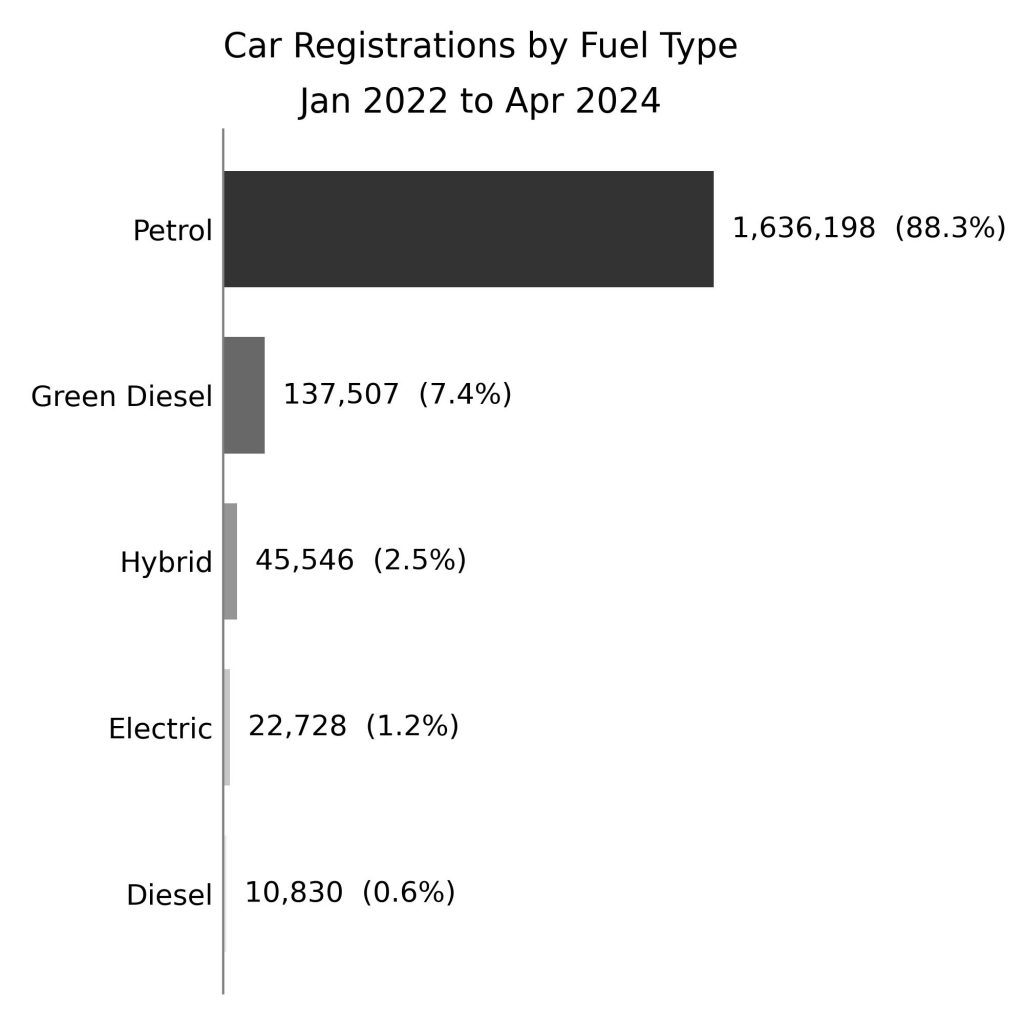
If we compare the total volume of EVs registered in Malaysia, EVs only represent a mere 1.2% for the period between January 2022 to April 2024. The majority of cars registered in Malaysia are powered by petrol at 88.3%, followed by Green Diesel at 7.4% and Hybrid at 2.5%.
However, if we look at the breakdown on a year-by-year basis, you’ll notice that EV adoption is still increasing steadily.
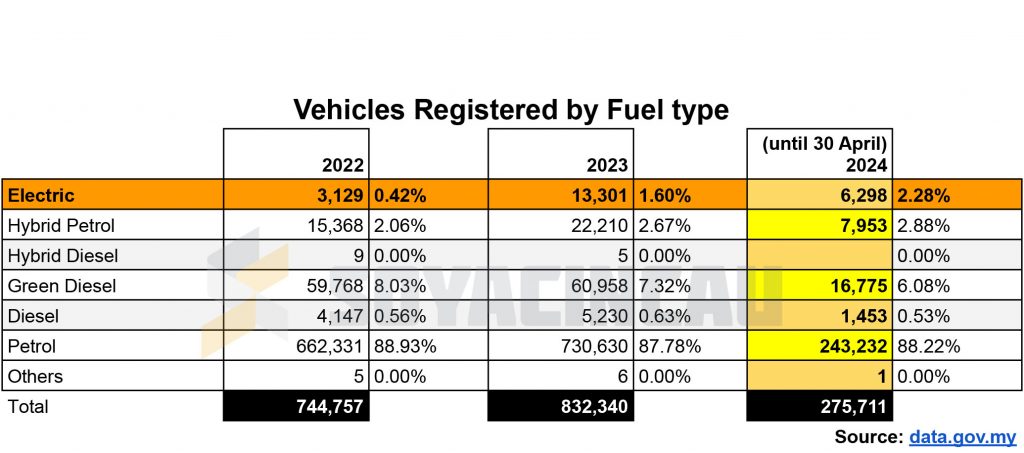
In 2023, a total of 13,301 out of 832,340 vehicles registered in Malaysia are electric (1.60%). And from 1st January until 30th April 2024, a total of 6,298 out of 275,712 vehicles registered are electric (2.28%).
It is worth highlighting that these total figures also include commercial vehicles and we are also seeing more adoption of EVs for commercial fleets. This includes IKEA, POS Malaysia, DHL and even Maxis.
Malaysia targets EVs to take up 15% TIV by 2030
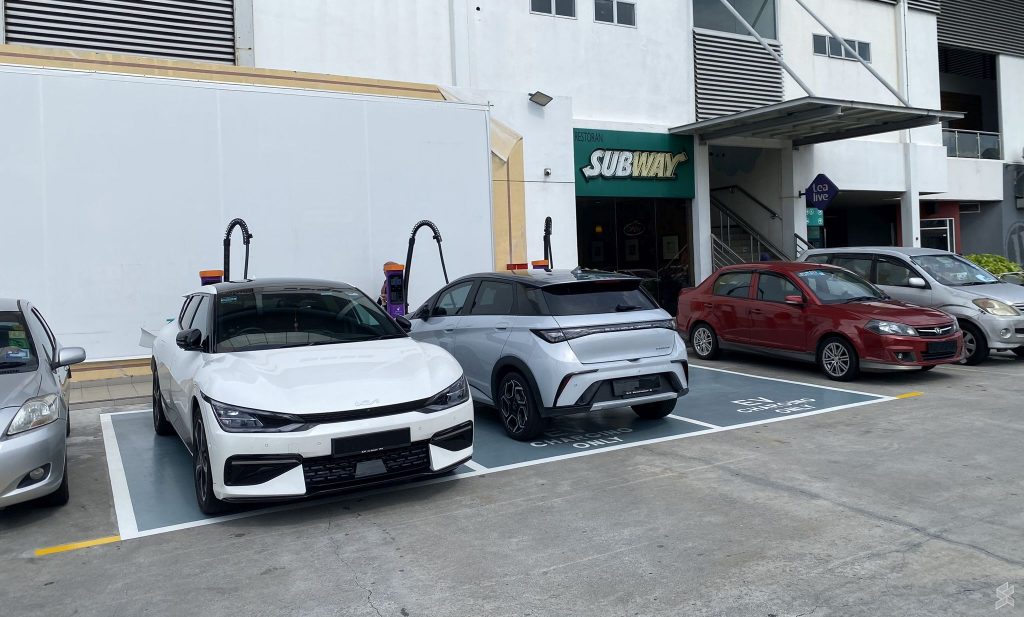
Malaysia has an ambitious goal for EVs to take up 15% of the total industry volume (TIV) by 2030, 40% by 2040 and 80% by 2050. There are several matters which the government has to look into if they want to drive mass adoptions of EVs and this includes the new road tax structure which has been long overdue. At the moment, road tax for EVs is exempted until 31st December 2025 but potential buyers are wary if the cost of road tax would greatly increase the cost of EV ownership.
In addition, the deployment of EV infrastructure also plays a role in building range confidence among buyers. The government aims to have 10,000 EV charge points by 2025 and they have recently announced that it aims to have 1,500 DC charge points by 2025.
Access to affordable EVs especially the sub-RM100,000 segment is also important to drive EV adoption in Malaysia. The two national carmakers Proton and Perodua have pledged to deliver their first EV by 2025. Proton is expected to launch two EV models soon and they have recently teased a possible new sub-brand for its EV lineup.
Thanks to Thevesh Theva for the heads-up!

